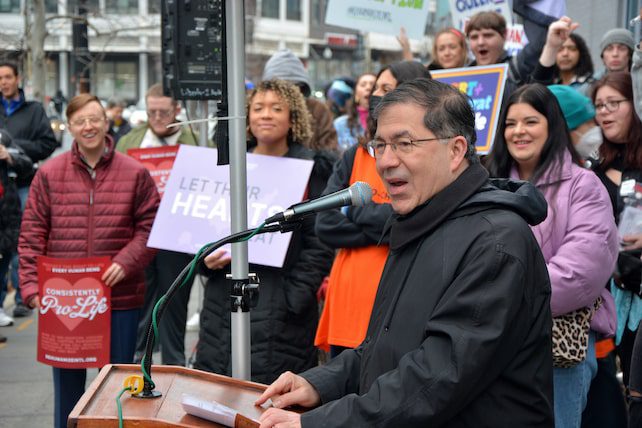WASHINGTON (RNS) — Frank Pavone, an anti-abortion activist who was until recently a Catholic priest, addressed a small crowd outside a Planned Parenthood clinic on the eve of this year’s March for Life, the annual demonstration against the 1973 Roe v. Wade decision, and repeated what has become a frequently posed question in the wake of Roe’s reversal in June.
“Many people in the recent months have been asking, ‘Will there still be a March for Life in Washington?'” said Pavone, who was defrocked in November for “persistent disobedience” of his bishop’s orders to stop his political activity and for what the Vatican called “blasphemous” social media posts. “And our response as a movement has been: ‘Yes, of course there will be. There needs to be. We continue marching simply because abortion continues killing.’”
There will be a 50th anniversary March for Life on the National Mall on Friday (Jan. 20), with an appearance by evangelist Franklin Graham and other prominent religious figures. But since last summer’s Dobbs v. Jackson Women’s Health Organization decision allowed states to determine their own abortion policies, much of the focus of the abortion fight has moved to statehouses across the country.
In North Carolina, where abortion is permitted through 20 weeks of pregnancy, about 1,000 anti-abortion protesters descended on Raleigh to pray and march past the governor’s house, for the state’s 25th annual March for Life.
“Because of the overturn — thank God — of Roe versus Wade, now it’s on the state level,” said Angela Harrigan, who traveled by bus with dozens of others from St. Therese Catholic Church in Mooresville, where she is a Respect Life Committee co-chair. “We want our actions to be witnessed at a state level, that we’re for life and Jesus is the author of life.”
In Michigan, where voters approved Proposal 3, a constitutional amendment preserving the state’s abortion rights, in November, anti-abortion advocates say the energy spent fighting the proposal afforded them less time to organize to attend the national march this year.
“We had amazing, really pro-life laws that, with the overturning of Roe, would go into effect,” said Kathleen Wilson, who coordinates the Archdiocese of Detroit’s Pro-Life and Project Rachel Ministries. “So we went from fighting for that and having so many great laws in place, to now being one of the most extreme permissive states with what’s in our constitution.” She described the success of Proposal 3 as “kind of a gut punch.”
Christen Pollo, executive director of Protect Life Michigan, plans to attend the national march but is also intent on showing the governor and legislators “that we are not giving up in the wake of Proposal 3” with a significant turnout for the Roe v. Wade Memorial March at the state Capitol on Jan. 28.

“My organization usually takes three busloads of college students and we didn’t this year,” she said of the national march. “We’re actually holding one in Michigan now to represent the fact that this battle has now returned to the state. So I’m interested in seeing what the crowd sizes will be like this weekend, given that I know many states are doing that same thing.”
RELATED: Clergy file suit over Missouri abortion ban, arguing it establishes a religion
Ten years ago, when she was new to her role, national March for Life President Jeanne Mancini said she expected marchers to continue their annual pilgrimage to Washington “until we work ourselves out of a job.” But days before the national gathering, Mancini said the mission is far from complete.


